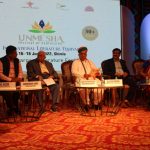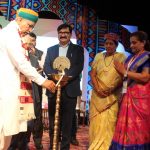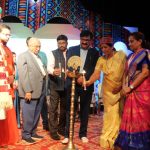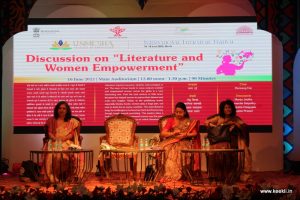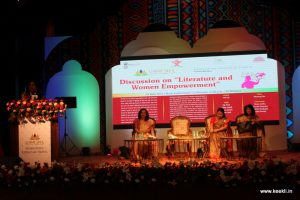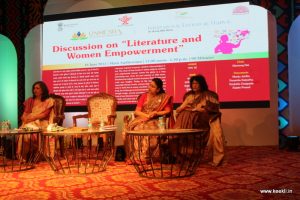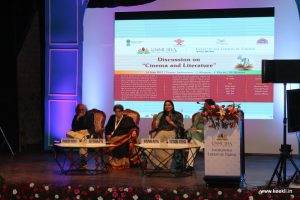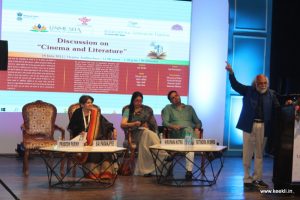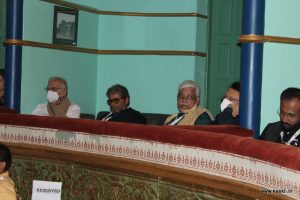
The International Literature Festival kick-started with much fan and fervour in the presence of an eminent guest list who shared their vision for creating UNMESHA and among the dignitaries were Chandrashekhar Kambar, President Sahitya Akademi, Arjun Ram Meghwal, Minister of Parliamentary Affairs and Culture, Meenakshi Lekhi, Minister of State External Affairs and Culture, Jagadguru Ramanandacharya Swami Rambhadracharya, distinguished scholar and saint, Govind Singh, Minister of Education and Language and Culture Government of Himachal Pradesh and Uma Nanduri, Joint Secretary Ministry of Culture Government of India here today at the historic Gaiety Theatre, Shimla.

Kambar spoke about the impact literature has on our lives, its historical importance, the goal and vision of Sahitya Academy with this festival and what they gained to achieve in the course of three days. Meghwal elaborated on the numerous domains and topics which were to be covered during the event, as he shared the concept of unity in diversity and the strength that India holds, thanks to its diversity. He explained that the scope of development has been increasing and by promoting such activities, a blueprint of a promising future is can be created.
Jagadguru Ramanandacharya Swami Rambhadracharya spoke about the literary aspects of religion, mythology and fellow historical texts. These texts as he shared have made us a rich country with not only a strong literary background but also a very esteemed cultural and religious history. Govind Singh praised the state for its culture and the warm welcome it offers to various activities such as a literary fest; he believes that the people love to celebrate their culture and heritage, thus, having a literary fest in Shimla is a moment of great pride for the state and its people. Many artists from Himachal too are a part of this festival, and he believed that hosting such events in the future would be a great opportunity for the youth and for the development of the state. Uma Nanduri, ended the session by reiterating about the significance of literature in our life and various topics that come under literature and their impact on one other.
Each hall of the Gaiety Complex offered a diverse discourse and discussions such as — literature and women empowerment; what literature means to me; challenges confronting LGBTQ+ writers and readings; cinema and literature.
The session on Literature and Women Empowerment was chaired by Mamang Dai while the discussants were Manju Jaidka, Paramita Satpathy, Sanjukta Dasgupta and Sujata Prasad. They shared their views on how women have empowered literature with their views and changed the ways of writing and portrayal of genders. The discussions had one common point, they took the instances of women from daily life and portrayed their experiences through their writings and different literary medium. There are numerous examples of literary works such as stories and folklore which showed that women have been portrayed in numerous roles and ways in our history and we have to analyse that literature and correct the misconceptions about how a woman has been presented for centuries. Women have been critics of numerous works as they have experienced and have studied the patriarchal hegemonies and dominance of social hierarchies in daily life to great lengths thus, they can provide and explain a completely new perspective with multiple theories.
What Literature Means To Me was chaired Arjun Ram Meghwal and the participants were Raghav Chandra, Ram Naik, Satish Alekar. The discussion had many contemporary issues concerning which the participants voiced their opinions, also views regarding contemporary societies and new-old cultures were explored and introduced. The phenomena of literature’s evolution over the years and how it helps people understand the world, were some of the many ideas that made the discussion very rich. The literature world is very abundant, full of political views, journalistic views, gendered views and sustainable views, thus, it was interesting to note that the topics linked literature to multiple disciplines and substantiated the fact that literature is the strongest medium of expression and connection.
A discussion on Cinema and Literature which was chaired by Sai Paranjpye and the discussants were Nirupama Kotru, Prabodh Parikh, and Yatindra Mishra. It featured discourses on whether cinema is adapted from literature or is now cinema making inroad to create independent literature. Emphasis was made on the importance of script writing and how a good cinema was created with this focus. The panel event highlighted on the idea of ‘escapism cinema’ which was purely based for entertainment purposes. The discussion on ‘Cinema and Literature’ was continued during an afternoon session which was chaired by Gulzar and the discussants were Atul Tiwari, Gautam Ghose, Ratnottama Sengupta and Vishal Bhardwaj.


https://youtu.be/qIFubRX6G4A
Each session was extremely enriching as they featured artists who have been studying and engaging with cinema for 50 plus years. The views of professionals historians, poets, writers and directors present in the panel were quite detailed and offered a unique insight into the world of cinema. Many mentions were made to mythology which created several cinematic projects such as Mahabharata and Ramayana, these were famous hits because these oral traditions were known to everyone, thus creating projects with these themes was the most promising project an artist could take at that time. The discussion suggested that the cinema has been on a long journey and has finally stopped borrowing from literature and is forming new literature which is created by cinema. The literature of cinema is very modern as it is relevant to the present time and what needs to be known, this concept is evident in the movies of the present as they are with contemporary issues and not with mythological concepts. Script writing as discoursed by the panellists is suggested to be a part of cinema literature. Scripts can be originated in various forms sometimes as novels and plays and sometimes curated scripts don’t receive justice because the movies aren’t made according to the intentions of the author thus the participants stated that every movie should have the essence of the author’s soul and ideology. Cinema is a visual medium that can be presented to audiences who do not understand literature, this is also the manor reason why cinema is more popular than mainstream literature. Cinema and literature have always had a very dynamic relationship but are undeniably symbiotic which was concluded by the elaborate discussion.

The session on What Poetry Means To Me was chaired Arjun Deo Charan and the participants were Udayan Thakker (Gujarati) Nitu (English) Nishith Mishra (Urdu) Readings Jyotirekha Hazarika (Assamese) Mohan Singh (Dogri) Vinod Joshi (Gujarati). It was a general discussion on poetry along with poetry recitals in different languages. Without poetry, our worlds will be barren despite it is rational and clear thinking which drives much of everyday activity. However, very little is understood about how poets perceive poetry. The panel explained the impact of poetry on their lives and its impacts on the life of its readers. The poets believed that poetry doesn’t only help them express themselves but it makes them creative enough to explain emotions, themes and experiences in few words but with powerful impact. Poetry just like any other form of literature enables individuals to express themselves but it is more fun than any other form of literature, well, it does give competition to the cinema but poetry in itself is very personal and unique as it doesn’t cater to many people as the intention of the author of the varies but is understood and perceived differently and subjectively by the audiences, thus it’s contradictory in nature also. The conclusion was drawn that poetry is an art that anyone can practise and it is an art that guarantees happiness.


